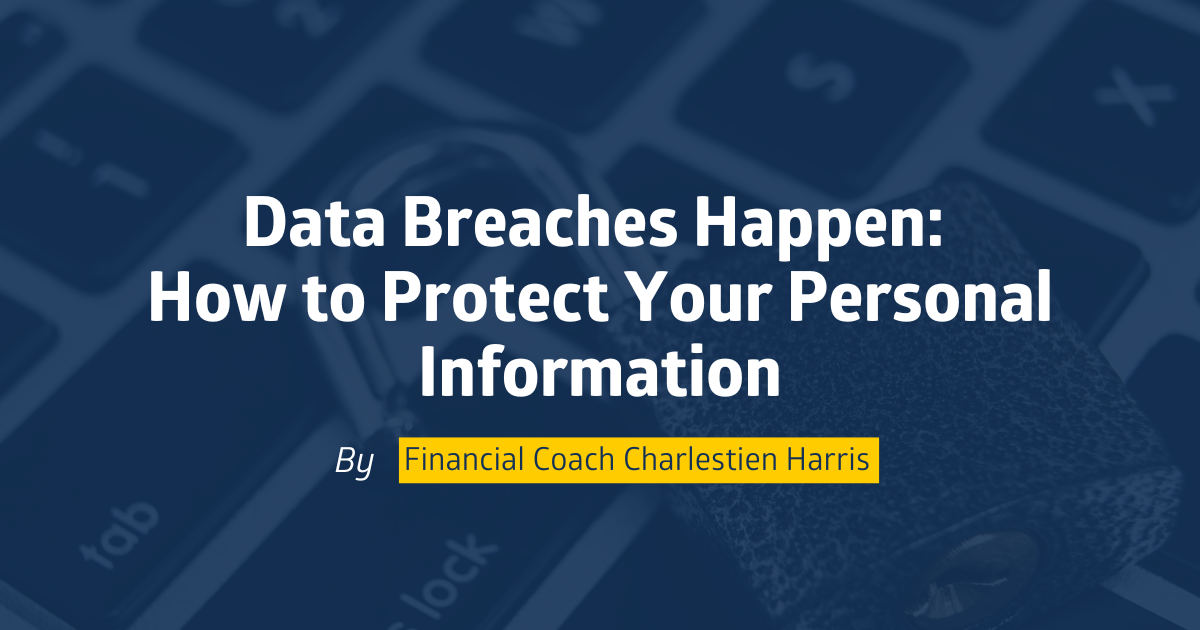By Charlestien Harris
With the increase in major data breaches lately, I thought it would be a great time to discuss some ways you, as a consumer, can help protect your sensitive personal information. It’s never a good day when you receive an alert that your personal information may have been exposed in a data breach. Unfortunately, these breaches are becoming more common and happening more frequently. Just a few weeks ago, there was “a massive data breach that compromised the Social Security numbers and other data of millions of Americans,” including their names and addresses, according to USA Today.
While it may be tempting to say, “Oh well,” this situation should not be taken lightly. There are steps you can and should take if your sensitive information is compromised. Taking action now can help prevent further issues down the road.
- Change your passwords and secure your accounts.
If your data has been exposed, the first thing you should do is change the passwords for all the affected accounts. This applies to any website where you were using the same or similar login information. Changing your password can be a hassle, but it’s one of the best defenses you have when protecting your information. Also, consider setting up two-step verification to further secure your accounts. - Use a password management program.
If you’re like me and worry about remembering long, complicated passwords, consider using a password manager. These easy-to-use apps generate highly secure, unique passwords and remember them for you. Typically, all you need to remember is one master password. - Check your credit card statements.
It’s essential to review your credit card statements for any suspicious activity or fraudulent charges. If you spot anything unfamiliar, immediately contact your card issuer to verify the charges and ensure they know you didn’t authorize them. Most often, your liability is limited to only $50, or less, if you report the issue promptly. - Review all three of your credit reports.
In addition to checking your existing accounts, review all your credit reports. This can help you identify any unusual activity related to credit fraud or identity theft. Look for unauthorized loans, credit card accounts, or unfamiliar addresses added to your personal information. You can check all three credit reports from the major credit bureaus for free by visiting www.AnnualCreditReport.com. While you won’t receive your credit score unless you pay for it, you can access the information contained in your report. - Consider freezing your credit report or setting up fraud alerts.
A credit freeze is a smart financial security measure if you’re concerned that your personal information may have been stolen. Freezing your credit prevents creditors from accessing your report, which is required when applying for new credit. It’s easy and free to do – simply contact each of the three credit bureaus, Equifax, Experian, and TransUnion, either by phone or through their websites. - Activate a fraud alert as an alternative.
If you don’t want to lock out creditors – perhaps because you’re applying for a mortgage or car loan – you can add a fraud alert to your credit reports instead. This option flags your accounts so that potential creditors must verify your identity before issuing new credit in your name. Fraud alerts typically last for one year, after which you can renew them.
My best advice is to always remain vigilant. Don’t let your guard down just because you’ve followed the tips mentioned in this article. The unfortunate reality is that personal information exposed during a data breach poses a serious fraud risk, and a range of sensitive information could end up in the hands of criminals or on the dark web. Staying aware of account activity and regularly reviewing your credit reports is a smart way to stay protected. Additionally, keeping up to date on the latest scams can help you stay defensive and recognize common phishing attempts.
For more information on this and other financial topics, you can email me at Charlestien.Harris@banksouthern.com or call me at 662-624-5776. You can also visit www.banksouthern.com/blog.
Until next week – stay financially fit!
